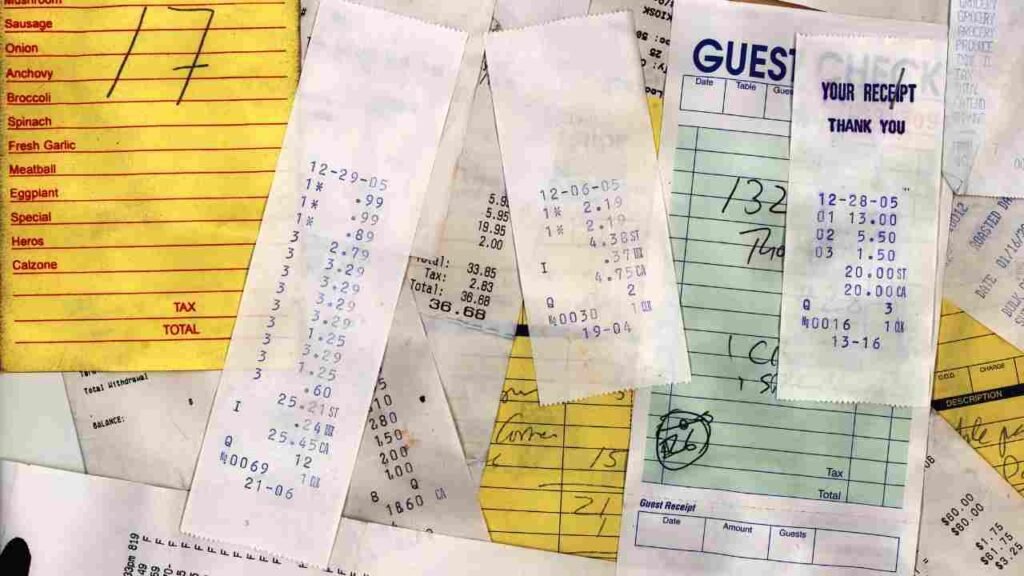
In an era where receipts serve as crucial evidence in our consumer-driven lives, a growing concern threatens the trust we place in these small slips of paper: fake carpet cleaning receipts. These seemingly innocuous counterfeits can have far-reaching consequences for unsuspecting consumers, posing risks beyond financial loss.
As we dive into the murky world of fraudulent receipts, we’ll explore the motivations behind their creation, the potential dangers they present, and the vital importance of distinguishing genuine receipts from their deceptive counterparts.
Prepare to uncover the hidden dangers lurking beneath the surface as we navigate the realm of fake carpet cleaning receipts and arm ourselves with the knowledge needed to protect our interests.
The Rise of Fake Carpet Cleaning Receipts:
1. Explanation of why fake receipts are becoming more common
In recent years, the alarming rise in the prevalence of fake carpet cleaning receipts has caught the attention of consumers and industry professionals alike. But what has led to this troubling trend? Several factors contribute to the increasing occurrence of fraudulent receipts in the carpet cleaning industry.
Firstly, the widespread availability of sophisticated technology has made it easier than ever for unscrupulous individuals to create convincing replicas. With the proliferation of high-quality printers, scanners, and graphic design software, forging receipts has become a more accessible endeavor.
These tools allow fraudsters to replicate the appearance of legitimate receipts with remarkable accuracy, making it increasingly difficult for consumers to spot the fakes.
The rising demand for affordable carpet cleaning services has created fertile ground for fraudulent activities. As consumers seek cost-effective options, some unlicensed or unqualified individuals and companies seize the opportunity to exploit the market.
These illegitimate operators may issue fake receipts to deceive customers into believing they received professional services while cutting corners or even failing to perform the job.
2. Highlight the motivations behind creating fake receipts
Understanding the motivations behind the creation of fake carpet cleaning receipts is crucial in comprehending the scale and impact of this issue.
One primary motive is financial gain. Fraudulent operators use fake receipts to manipulate their accounting records, underreport income, and evade taxes. By creating false paper trails, they can hide their earnings and avoid their rightful obligations to the government.
Another motivation is to deceive customers and provide a false sense of legitimacy. Fraudsters recognize that consumers often trust receipts as proof of services rendered. Issuing fake receipts can create an illusion of credibility, enticing customers to choose their services over legitimate providers.
This deceitful practice undermines the reputation of genuine businesses and leaves customers vulnerable to potential harm.
3. Discuss the negative consequences for both consumers and legitimate businesses
The rise of fake carpet cleaning receipts has far-reaching consequences for consumers and legitimate industry businesses. For consumers, the most immediate impact lies in the financial realm. They may face overpayment for subpar or nonexistent services, resulting in wasted money and a sense of betrayal.
Furthermore, these fraudulent receipts can jeopardize warranty claims and insurance coverage. In the event of damage or disputes, consumers may be unable to seek rightful compensation or assistance without valid receipts.
Identifying Fake Carpet Cleaning Receipts:
1. Key indicators of fake receipts:
When identifying fake carpet cleaning receipts, there are several key indicators to watch out for. While fraudulent receipts can be quite convincing, paying attention to the following red flags can help you differentiate between genuine and fake documents:
- Inconsistent or illegible information: Fake receipts often contain errors or inconsistencies in the details provided. Look for misspelled words, incorrect dates or service descriptions, and inconsistent formatting. Legitimate receipts are typically well-organized and free from such mistakes.
- Poor quality printing or paper: Fake receipts may exhibit signs of low-quality printing, including blurred text, smudged ink, or uneven alignment. Additionally, the paper may feel flimsy or lack the durability of professional receipts.
- Lack of professional contact information: Legitimate carpet cleaning receipts usually feature clear and accurate contact information for the cleaning company, including a valid phone number, email address, and physical address. Fake receipts often lack this crucial information or provide generic, non-specific details.
2. Tips for verifying the authenticity of a receipt:
While spotting key indicators can be helpful, taking a few extra steps to verify the authenticity of a receipt can provide further assurance. Here are some practical tips to consider:
- Contact the cleaning company directly: Reach out to the carpet cleaning company listed on the receipt and inquire about the specific transaction. Legitimate companies will readily provide information and confirm the validity of the receipt.
- Verify the company’s credentials and reputation: Research the cleaning company to ensure they are reputable and licensed. Check for online reviews, ratings, and certifications that validate their expertise and professionalism.
- Compare the receipt with legitimate examples online: Familiarize yourself with genuine carpet cleaning receipts by searching for examples from reputable companies. Comparing the receipt’s format, design, and content with legitimate ones can help you identify any discrepancies.
The Risks of Using Fake Receipts:
Using fake carpet cleaning receipts may initially seem convenient to save money or deceive others, but the potential risks and negative consequences far outweigh any perceived benefits. Understanding the risks involved before considering or engaging in such deceptive practices is crucial. Here are some of the dangers associated with using fake receipts:
1. Negative impact on warranty claims and insurance coverage:
Using a fake receipt to claim warranty coverage or file an insurance claim can have severe repercussions. In many cases, warranty agreements and insurance policies require valid proof of purchase or service documentation. If caught using a fraudulent receipt, you may lose out on the warranty or insurance benefits and face legal consequences for attempted fraud.
2. Compromised consumer rights in case of disputes:
When disputes arise, whether it’s regarding the quality of the cleaning service or the damage caused, genuine receipts act as essential evidence to support your claims as a consumer. Using a fake receipt diminishes your credibility and weakens your position in resolving disputes.
Legitimate businesses and authorities will question the authenticity of the receipt, potentially leaving you without the recourse you deserve.
3. Support for illegitimate businesses engaging in fraudulent activities:
By utilizing fake receipts, you inadvertently support and perpetuate fraudulent activities in the carpet cleaning industry. Illegitimate operators who issue fake receipts often engage in substandard or dishonest practices, taking advantage of unsuspecting customers.
By patronizing such businesses or using their fabricated receipts, you contribute to the erosion of trust within the industry and potentially harm fellow consumers.
The Importance of Genuine Carpet Cleaning Receipts:
Genuine carpet cleaning receipts serve a vital purpose in safeguarding the interests of both consumers and businesses. They provide tangible evidence of transactions and services rendered, offering a range of benefits that should not be overlooked. Let’s explore why genuine receipts are essential:
1. Ensuring proper documentation for warranty and insurance purposes:
Regarding warranty claims or insurance coverage related to carpet cleaning services, genuine receipts play a crucial role. These receipts prove the specific services performed, the service date, and the payment.
In case of any issues or disputes, having a genuine receipt can help validate your claims and ensure you receive the benefits you are entitled to.
2. Providing evidence of services rendered in case of disputes:
Disputes can arise in any business transaction, including carpet cleaning services. Genuine receipts act as concrete evidence of the services that were provided. They detail the scope of work, the cleaning methods used, and any additional treatments applied. In disagreements or dissatisfaction with the results, a genuine receipt can support your position and help you reach a fair resolution.
3. Supporting legitimate businesses and the economy:
By insisting on genuine carpet cleaning receipts, you actively support legitimate businesses and contribute to the growth and sustainability of the industry. Genuine receipts are typically issued by licensed, professional companies that adhere to industry standards and regulations. Patronizing these businesses encourages fair competition, high-quality services, and a healthy economy.
Moreover, genuine receipts help establish trust and transparency between consumers and businesses. They demonstrate accountability, professionalism, and a commitment to providing reliable services. Genuine receipts also enable consumers to make informed decisions, compare prices, and evaluate the value they receive for their investments.
Consequences for Perpetrators of Fake Receipts:
Perpetrators of fake carpet cleaning receipts may believe they can escape detection and evade the consequences of their fraudulent activities. However, such deceptive practices can lead to severe legal implications and penalties. Let’s explore the potential consequences that await those who create and use fake receipts:
1. Legal implications and penalties for fraudsters:
Creating and using fake receipts is a form of fraud, a criminal offense in many jurisdictions. Law enforcement agencies take fraudulent activities seriously and actively investigate cases of receipt forgery.
If caught, perpetrators can face criminal charges, including but not limited to fraud, forgery, identity theft, and falsifying documents. The severity of these charges depends on local laws, the scale of the fraud, and the intent behind the fraudulent acts.
2. Financial liabilities and restitution:
Besides legal consequences, perpetrators of fake receipts may face significant financial liabilities. If their fraudulent activities resulted in financial harm to consumers or businesses, they may be held responsible for restitution or compensating the affected parties for their losses. This can include repaying the amount falsely obtained and covering any additional damages or costs incurred.
3. Reputational damage and future consequences:
Engaging in fraudulent practices can have long-lasting effects on the perpetrator’s reputation. Once their actions are exposed, their credibility and trustworthiness are severely compromised. This can result in a tarnished personal or business reputation, making it challenging to regain the trust of clients, customers, and partners. The negative consequences may extend beyond the immediate incident, impacting future business opportunities and personal relationships.
4. Collaboration between consumers and law enforcement agencies:
Consumers play a vital role in combating fake receipt fraud. By reporting fraudulent receipts to the appropriate authorities, consumers can contribute to the investigation and prosecution of the perpetrators. Collaboration between consumers, legitimate businesses, and law enforcement agencies strengthens efforts to identify and bring fraudsters to justice.
Conclusion:
The prevalence of fake carpet cleaning receipts poses a significant threat to consumers and legitimate businesses. As we have explored the rise of these deceptive practices, the risks involved, and the importance of genuine receipts, it becomes clear that vigilance and authenticity are paramount. Genuine receipts are essential documentation for warranty claims, insurance coverage, and dispute resolution, ensuring consumer rights are protected.
Furthermore, supporting legitimate businesses promotes a trustworthy industry and a thriving economy. Perpetrators of fake receipts face severe legal consequences, financial liabilities, and reputational damage.
By staying informed, recognizing red flags, and reporting instances of fraud, consumers can play a pivotal role in deterring these fraudulent activities.
Let us prioritize integrity, transparency, and accountability, forging a path toward a carpet cleaning industry built on trust and authenticity.
